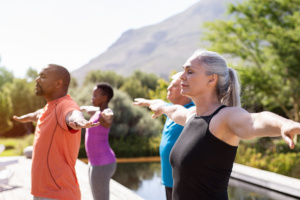Take a Deep Breath:
Stress Relief Techniques for Seniors
Article By | Comfort Keepers
Stress destroys cells in the hippocampus, a brain site responsible for memory storage and retrieval.
Stress Relief
In many ways, stress is a part of life for all of us. But for seniors, stress can have a larger effect on physical and mental wellness.
Having worries and concerns is natural, but it is more important as we get older to practice stress-reduction techniques to manage these thoughts.
The great news is that stress, and the techniques to manage it, are usually easy for most people to practice. Meditation, breathing exercises, physical movement and other tactics can help seniors continue to live the best quality of life and can even improve overall wellness.
Why is it critical to manage stress?
As we continue to keep our homes and families safe during COVID-19, it’s even more important to focus on the mental health needs of our seniors when it comes to stress.
Several studies have shown that stress is linked to mental and physical problems, from anxiety and depression to hypertension and immune system complications. In fact, it’s estimated that stress increases the risk of heart disease by 40%, heart attack by 25%, and stroke by 50%. Not to mention the fact that stress can also exacerbate existing conditions – which can be very impactful for those with less efficient immune systems.
What can seniors do to manage their stress in a positive way?
Finding moments of joy and focusing on activities and hobbies that bring meaning and purpose can help seniors manage their stress. Fortunately, there are many more stress relief techniques that seniors can follow to help improve their own personal wellbeing. What senior clients use to manage their stress today can help better prepare them for any future stress.
Stress Relief Techniques
- Connection can help relieve stress. Seniors can call a friend or family member, have a video chat or spend time with loved ones when possible.
- Meditate at the same time every day or whenever feelings of stress or anxiety arise
- Practice deep breathing and mindfulness exercises
- Reach out to friends and family to connect and spend time together
- Follow a consistent exercise regimen and healthy diet, upon physician approval
- Journal or jot down thoughts and feelings at the end of each day – and be sure to take a moment to reflect on all the positive things that happened throughout the day
- Find a virtual volunteer opportunity to give back to the community
- Put together and execute a to-do list to increase productivity, decrease feelings of restlessness, and combat procrastination
- Join a yoga class or practice it at home (with physician approval)
- Listen to soothing or relaxing music, especially before bed
- Find a way to laugh, whether it’s by watching a funny TV show/movie or listening to a comedy album
Comfort Keepers® Can Help At Comfort Keepers®, we have spent the last twenty years perfecting the art of helping seniors and other adults maintain their peace, happiness, and joy. To us, every moment in a senior’s life is a unique opportunity to foster positivity, going beyond daily tasks. Our approach to care is called Interactive Caregiving™, a philosophy centered around four central aspects of life: mind, body, nutrition, and safety.
What’s more, our trained caregivers are selected with one specific quality in mind: empathy. Care that is empathetic is care that starts in the heart, and it allows us to meet our clients’ exact needs.
Learn more about our unique service offering by contacting a local Comfort Keepers office.
References
Healthline. “16 Simple Ways to Relieve Stress and Anxiety.” Web. 2018.
Huffington Post. “10 Health Benefits of Relaxation” by Sarah Klein. Web. 2014.
American Institute of Stress. “Improve Memory, Concentration, Productivity, and Health by Reducing Stress.” Web. 2018.
WebMD. “10 Relaxation Techniques That Zap Stress Fast.” Web. 2018.
